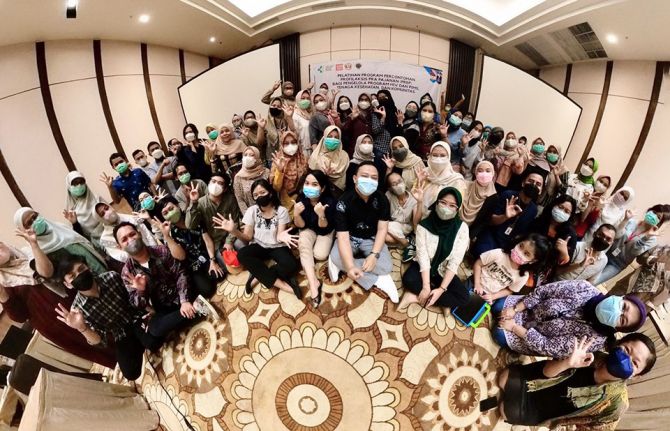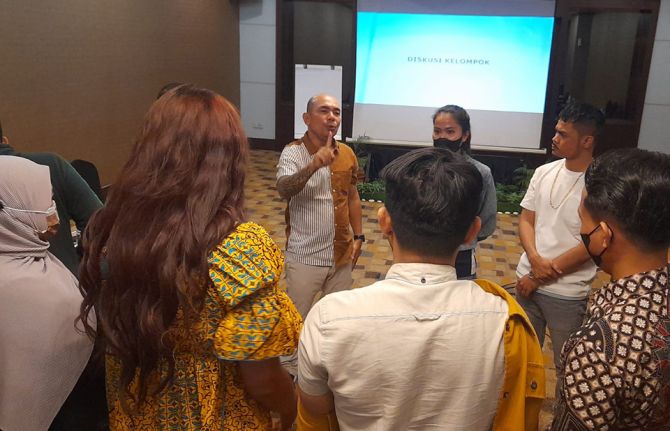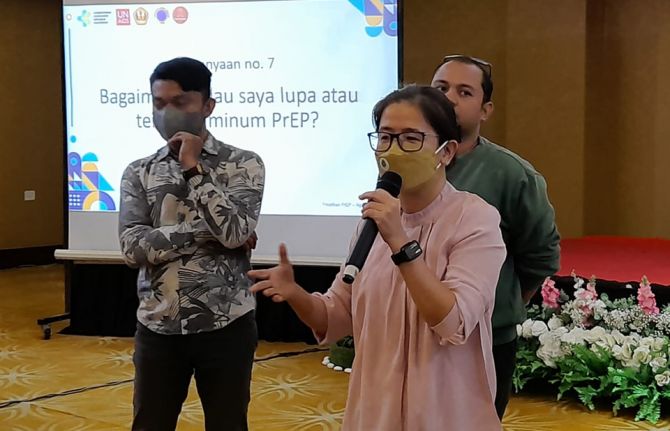



Feature Story
Successfully expanding the rollout of PrEP in Indonesia
01 September 2022
01 September 2022 01 September 2022While the number of new HIV infections in Indonesia decreased by 3.6% in 2021 to around 27 000, the country remains one of the countries with the highest number of new infections in the Asia and the Pacific region. Pre-exposure prophylaxis or PrEP is a medication that is highly effective at preventing HIV infection so making it available to groups of people most vulnerable is a key priority.
“In the past, I independently searched for information about PrEP because a client asked about it. I am glad there is a PrEP training that allows me to receive comprehensive information that I can then share with other people,” said Temmy a community outreach worker who participated in a training course in Bekasi.
PrEP was rolled out in Indonesia in 2021 as a pilot project to provide a new HIV prevention option which may be more convenient for people at risk of HIV, and to reduce new HIV infections among key populations such as sex workers and gay men and other men who have sex with men. It began in 12 districts, before expanding to 21 districts in 2022, with the aim of getting 7000 people on to PrEP.
As part of the expansion, a second round of training sessions was conducted in August across nine cities in Indonesia: Bogor City, Bogor Regency, Depok, Bekasi, Tangerang, Batam, Balikpapan, Samarinda, and Sidoarjo. Over 120 services providers from 24 hospitals and 47 outreach workers from local communities took part.
The PrEP training for health providers and community outreach workers was conducted by the Ministry of Health of Indonesia in partnership with Kerti Praja Foundation, Padjajaran University, and the national MSM-TG Network (GWL-INA). It was supported by donors, including the Global Fund to Fight AIDS, Tuberculosis and Malaria, USAID-PEPFAR and the Government of Australia’s Department of Foreign Affairs and Trade (DFAT).
"With less than a decade to go before our goal of ending AIDS by 2030, we must prioritize efforts to scale up combination prevention programmes, such as PrEP. The piloting of PrEP is critical to kickstart policy and programme development on PrEP in Indonesia. The conduct of training for service providers and community outreach workers is an integral part of the pilot implementation to ensure adequate capacities to provide PrEP services to communities in need,” said Krittayawan Boonto, the UNAIDS Country Director for Indonesia.
The PrEP training sessions are held over two days and include discussions between service providers and outreach workers. The aim is to equip and improve the capacity of the service providers and outreach workers to provide good quality PrEP services.
“This PrEP training has increased my knowledge of the alternative methods to prevent HIV. After this training, our health service office can now offer this new method of HIV prevention to our clients. We hope that this will contribute to the reduction of new infection risk. Thanks to this training, I have become more confident in providing PrEP services in the future,” said Doctor Elly from Lambuk Baja, Batam Province.
Unlike the first series of training sessions, the second was conducted in person and engagement was much higher. The enthusiasm also led to more active follow up after the training. One of the health centres in Bogor City started to provide PrEP services a couple of days after the end of the course. They also directly approached communities about the benefits of PrEP and within a month PrEP uptake had increased by 15%.
“As with all aspects of the HIV response, communities play a key role in the success of PrEP implementation. Contribution from the community is especially vital in the context of the pilot implementation in Indonesia, as communities of key populations with a substantial risk of HIV infection are the main beneficiaries of the programme,” said Muhammad Slamet, National Coordinator of the MSM-TG network (GWL Ina).



